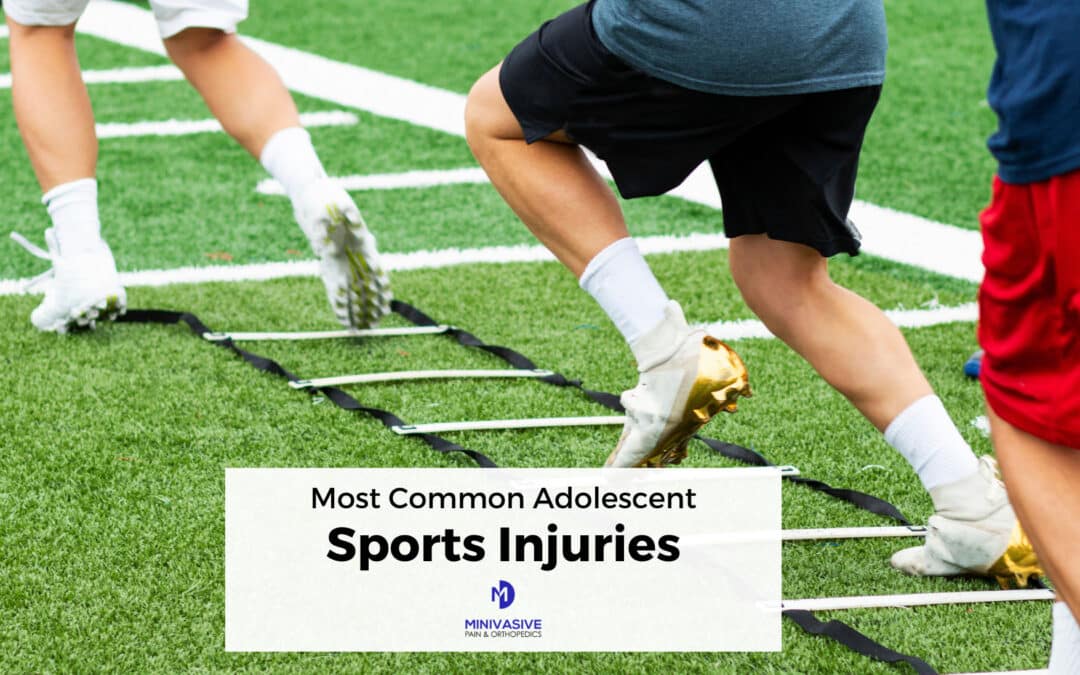Back to school season is officially here, which means middle and high school sports are back in full swing. As you gear up to cheer on your son or daughter from the sidelines, you may share a common worry with other parents of athletes: sports injuries. While no child ever wants to get injured, knowing what to look for and what to do if your child is injured can provide peace of mind. Check out the four most common sports injuries below, as well as easy things your child can do to help them avoid getting hurt.
Strains and Sprains
Strains and sprains are, by far, the most common sports-related injuries. A strain involves an injury to the tissue or muscle that attaches the muscle to the bone, while a sprain is an injury to the tissue that connects two bones together. Both have similar symptoms of pain, swelling and bruising. It’s also likely that your child heard a ‘pop’ sound when the injury occurred.
Overuse Injuries
Another common sports injury is overuse. Sports require many hours of training and practice, not to mention the other physical activity they do in gym class or when spending time with their friends. These countless hours add up, and can lead to overuse injuries such as stress fractures.
Stress fractures occur when a patient’s muscles can no longer take the stress of physical activity, putting that burden on the bones. As a result, the bone is strained, and can develop tiny breaks or cracks known as stress fractures.
Sports that require a lot of running and jumping, such as gymnastics, track and basketball are most likely to cause stress fractures, though it is possible to get a stress fracture from playing any sport.
To avoid stress fractures, your teen should be well conditioned and cross trained, and their coach should allow them to warm up and cool down during each practice. You can help your child avoid a sports injury by making sure they are properly hydrated and have the appropriate shoes for their sport.
Growth Plate Fractures
The growth plate is the most likely part of the body to experience a fracture. This is because the bones of pre-teens and teens are still developing.
The growth plate is where cartilage tissue is near the end of a bone. As your child becomes an adult, this cartilage solidifies into hard bone in a process called ossification.
If your child experiences a sports injury to their growth plate, it is imperative to seek care from an orthopedic surgeon. If the injury isn’t cared for properly, it can cause irreversible bone deformity and a host of other issues.
Head and Neck Injuries
The most dangerous of all sports injuries are those that occur to your child’s head and/or neck. High contact sports, like football and hockey, or sports where your child is midair, like gymnastics or pole vaulting, can cause devastating injuries. If your teen plays football, hockey, or participates in pole vaulting or gymnastics, be sure they always wear all protective gear and take every safety precaution possible.
Useful Tips for Avoiding Injury
The first step in avoiding sports injuries is to ensure your child is following all safety protocols for their sport. That includes wearing all required gear and protective equipment.
Make sure your teen is comfortable letting you know of any pain they may be feeling, even if they think it’s “minor,” and that they understand the importance of a warm up and cool down, even if they’re simply exercising at home. Your child should also not participate in sports until they’ve had a physical and have been cleared by their doctor.
Sports Medicine and Orthopedic Specialists in East Texas – Minivasive Pain and Orthopedics
At Minivasive Pain, our sports medicine and orthopedic specialists are here for your child. No matter their sports injury, our dedicated team of physicians is ready to help devise a treatment plan that works best for you and your teen, that helps them get back to the joys of high school sports.
With orthopedic centers throughout the Houston area, caring for pain is what we do every day. To learn more, or to schedule an appointment, visit https://minivasivepain.com/contact-us/ or call us at (346) 800-6001.

